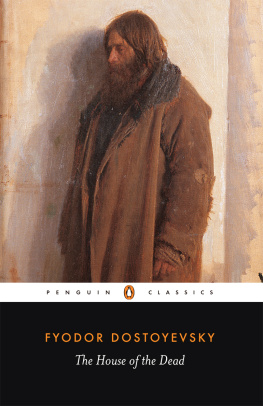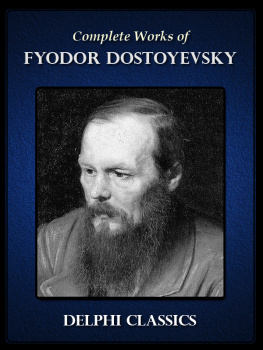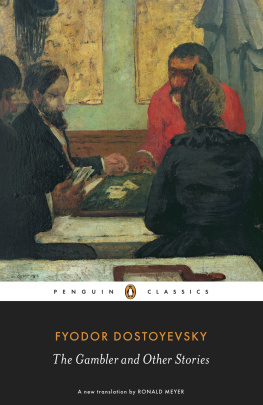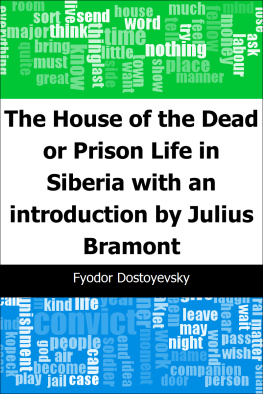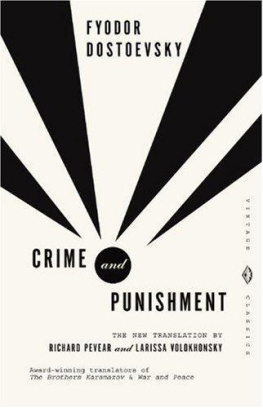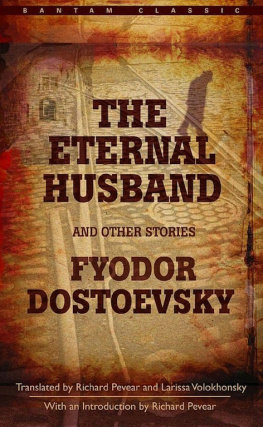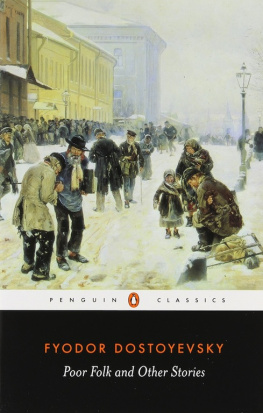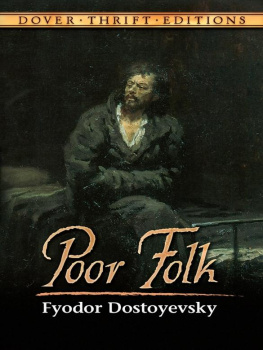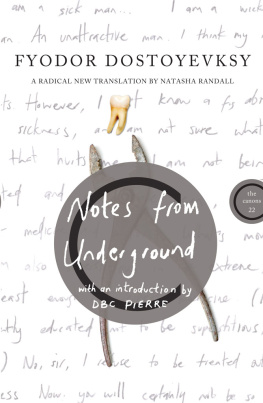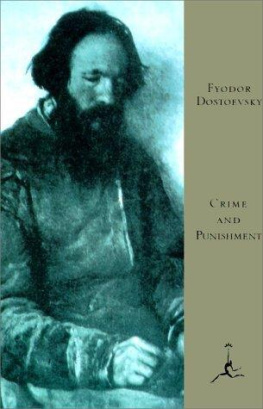Fyodor Dostoyevsky - The House of the Dead
Here you can read online Fyodor Dostoyevsky - The House of the Dead full text of the book (entire story) in english for free. Download pdf and epub, get meaning, cover and reviews about this ebook. year: 2003, publisher: Penguin Books Ltd, genre: Art. Description of the work, (preface) as well as reviews are available. Best literature library LitArk.com created for fans of good reading and offers a wide selection of genres:
Romance novel
Science fiction
Adventure
Detective
Science
History
Home and family
Prose
Art
Politics
Computer
Non-fiction
Religion
Business
Children
Humor
Choose a favorite category and find really read worthwhile books. Enjoy immersion in the world of imagination, feel the emotions of the characters or learn something new for yourself, make an fascinating discovery.
- Book:The House of the Dead
- Author:
- Publisher:Penguin Books Ltd
- Genre:
- Year:2003
- Rating:4 / 5
- Favourites:Add to favourites
- Your mark:
- 80
- 1
- 2
- 3
- 4
- 5
The House of the Dead: summary, description and annotation
We offer to read an annotation, description, summary or preface (depends on what the author of the book "The House of the Dead" wrote himself). If you haven't found the necessary information about the book — write in the comments, we will try to find it.
The House of the Dead — read online for free the complete book (whole text) full work
Below is the text of the book, divided by pages. System saving the place of the last page read, allows you to conveniently read the book "The House of the Dead" online for free, without having to search again every time where you left off. Put a bookmark, and you can go to the page where you finished reading at any time.
Font size:
Interval:
Bookmark:

THE HOUSE OF THE DEAD
FYODOR MIKHAILOVICH DOSTOYEVSKY was born in Moscow in 1821, the second of a physicians seven children. When he left his private boarding school in Moscow he studied from 1838 to 1843 at the Military Engineering College in St Petersburg, graduating with officers rank. His first story to be published, Poor Folk (1846), was a great success. In 1849 he was arrested and sentenced to death for participating in the Petrashevsky circle; he was reprieved at the last moment but sentenced to penal servitude, and until 1854 he lived in a convict prison at Omsk, Siberia. Out of this experience he wrote The House of the Dead (1860). In 1861 he began the review Vremya (Time) with his brother; in 1862 and 1863 he went abroad, where he strengthened his anti-European outlook, met Mlle Suslova, who was the model for many of his heroines, and gave way to his passion for gambling. In the following years he fell deeply in debt, but in 1867 he married Anna Grigoryevna Snitkina (his second wife), who helped to rescue him from his financial morass. They lived abroad for four years, then in 1873 he was invited to edit Grazhdanin (The Citizen), to which he contributed his Diary of a Writer. From 1876 the latter was issued separately and had a large circulation. In 1880 he delivered his famous address at the unveiling of Pushkins memorial in Moscow; he died six months later in 1881. Most of his important works were written after 1864: Notes from Underground (1864), Crime and Punishment (18656), The Gambler (1866), The Idiot (1869), The Devils (1871) and The Brothers Karamazov (1880).
DAVID MCDUFF was born in 1945 and was educated at the University of Edinburgh. His publications comprise a large number of translations of foreign verse and prose, including poems by Joseph Brodsky and Tomas Venclova, as well as contemporary Scandinavian work; Selected Poems of Osip Mandelstam; Complete Poems of Edith Sdergran; and No Im Not Afraid by Irina Ratushinskaya. His first book of verse, Words in Nature, appeared in 1972. He has translated a number of nineteenth-century Russian prose works for the Penguin Classics series. These include Dostoyevskys The Brothers Karamazov, Crime and Punishment, The House of the Dead, Poor Folk and Other Stories and The Idiot (forthcoming), Tolstoys The Kreutzer Sonata and Other Stories and The Sebastopol Sketches, and Nikolai Leskovs Lady Macbeth of Mtsensk. He has also translated Babels Collected Stories and Belys Petersburg for Penguin.
FYODOR DOSTOYEVSKY
Translated with an Introduction by
DAVID MCDUFF
PENGUIN BOOKS
PENGUIN BOOKS
Published by the Penguin Group
Penguin Books Ltd, 80 Strand, London WC2R 0RL, England
Penguin Putnam Inc., 375 Hudson Street, New York, New York 10014, USA
Penguin Books Australia Ltd, 250 Camberwell Road, Camberwell, Victoria 3124, Australia
Penguin Books Canada Ltd, 10 Alcorn Avenue, Toronto, Ontario, Canada M 4V 3B2
Penguin Books India (P) Ltd, 11 Community Centre, Panchsheel Park, New Delhi 110 017, India
Penguin Books (NZ) Ltd, Cnr Rosedale and Airborne Roads, Albany, Auckland, New Zealand
Penguin Books (South Africa) (Pty) Ltd, 24 Sturdee Avenue, Rosebank 2196, South Africa
Penguin Books Ltd, Registered Offices: 80 Strand, London WC2R ORL, England
www.penguin.com
This annotated edition first published 1985
Reprinted with a new Chronology and Further Reading 2003
Copyright C David McDuff, 1985,2003
All rights reserved
Except in the United States of America, this book is sold subject to the condition that it shall not, by way of trade or otherwise, be lent, re-sold, hired out, or otherwise circulated without the publishers prior consent in any form of binding or cover other than that in which it is published and without a similar condition including this condition being imposed on the subsequent purchaser
9780141915869
On 23 January 1850, Dostoyevsky entered the prison fortress at Omsk, Western Siberia, to begin a four-year term of penal servitude for his part in the Petrashevist conspiracy. In 1854, some ten months after his release from prison, he wrote to his younger brother Andrey: I consider those four years as a time during which I was buried alive and shut up in a coffin. Just how horrible that time was I have not the strength to tell youit was an indescribable, unending agony, because each hour, each minute weighed upon my soul like a stone.
In the prison Dostoyevskys sufferings were compounded by the fact that, for at least the first year of his sentence, he found himself almost totally isolated. He was a nobleman, while nearly all the other convicts seemed to belong to the peasantry and the artisan classes. The full horror of his experience of prison is given vivid utterance in the first letter he wrote after his release. It was addressed to his brother Mikhail:
I had got to know something of the convict population back in Tobolsk; here in Omsk I was to live for four years in close proximity to it. These men were coarse, irritable and malicious. Their hatred of the nobility knew no limits, and so they received us noblemen with hostility and a gleeful schadenfreude. If they had had half a chance they would have devoured us. Consider for yourself what sort of protection we had against them, when we had to live, drink, eat and sleep with them for several years, and when to complain was impossible, given the myriad variety of the insults and affronts to which we were exposed. Youre noblemen, iron noses, you nosed us to death. When you were a gentleman you used to make our lives a misery, now youre worse off than the lowest trash among us, youre our brother now: such was the refrain they repeated to me in chorus for four years on end. A hundred and fifty enemies never wearied of persecuting us; this was their amusement, their entertainment, their occupation, and the only thing that saved us from this misery was our equanimity, our moral superiority, which they could not help but comprehend and which they respected as a sign that we were not subservient to their will. They always acknowledged our superiority to them. They had no inkling of what our crime might have been. We ourselves never said anything about this, and so we had to put up with all the persecution and vindictiveness which they brought to their dealings with the nobility, and which were the very breath of life for them. Our living conditions were terrible. A military prison is much tougher than a civilian one. Throughout those four years I lived nowhere but within the confines of the prison, leaving it only in order to go to work. The work we had to do was physically arduous (although not always, however), and it would happen that I would grow exhausted in the rain, the wet, the sleet or, during winter, in the intolerable cold. I once spent four hours on special emergency work when the mercury in the thermometer had frozen and the temperature must have been forty below. I got frost-bite in one of my legs. We lived all of a heap, crowded together in one barrack. Imagine, if you will, this dilapidated old wooden building which had long ago been scheduled for demolition, and which was now quite unfit for use. In summer the airlessness inside was intolerable, likewise the cold in winter. All the floors had rotted through. The floor was covered in nigh on two inches of muck; it was easy to slip and fall. In winter the small windows were covered in hoar-frost, making it almost impossible to read for much of the day. The ice on the windowpanes was also nearly two inches thick. There were leaks in the roof, and a constant draught prevailed. We were packed in like herrings in a barrel. Only six logs were used to heat the stove; there was no warmth (the ice in the room barely melted at all), but terrible fumes and this went on all winter. The convicts washed their linen in the barracks, and the whole of the small room would be fairly awash with water. There was no space to turn round in. From dusk to dawn no one could go outside to relieve himself, as the barracks were locked up; instead, a tub was placed in the passage, and the stink was intolerable. All the convicts stank like pigs, and they would say that they could not help behaving like pigs, that man is only human. We slept on a bare plank bed, and were permitted one pillow. We had to cover ourselves with our short sheepskin coats, our legs sticking out all night uncovered. All night we shivered. There were fleas, lice and cockroaches by the bushel. In winter we wore our short coats, which were often of the most miserable quality and which hardly kept us warm at all, and our short-legged boots for walking about in the snow and the subzero temperatures, if you please. For food we were given bread and a cabbage soup which contained a quarter of a pound of beef per man; but the beef was ready diced, and I never saw any of it. On holidays there was kasha with practically no vegetable oil in it at all. On fast days there were cabbage leaves and water and hardly anything else. I suffered terrible stomach trouble and was ill several times. You can judge for yourself whether it would have been possible to live without money; if I had had no money, I would certainly have died and no one, not one of those convicts, could have stood such a life. But each man worked at some trade or other, sold his merchandise and made a copeck or two. I lived on tea and the occasional piece of beef which I bought for myself, and this saved me. It was also forbidden to smoke, for men might have suffocated in such airless conditions. Smoking was done on the sly. I was often a patient in the hospital. Because my nerves were upset I suffered fits of epilepsy, but these were rare. I also have rheumatism in my legs. Apart from this, I feel quite well. Add to all these delights the almost total unavailability of books what you got, you got on the sly the continual animosity and quarrelling around you, the cursing, the shouting, the noise, the hubbub, always being under guard, never alone, and this for four years without a break, you will, I think, forgive me for saying that life was terrible.
Font size:
Interval:
Bookmark:
Similar books «The House of the Dead»
Look at similar books to The House of the Dead. We have selected literature similar in name and meaning in the hope of providing readers with more options to find new, interesting, not yet read works.
Discussion, reviews of the book The House of the Dead and just readers' own opinions. Leave your comments, write what you think about the work, its meaning or the main characters. Specify what exactly you liked and what you didn't like, and why you think so.

